|

by Ben Potter
February 10, 2025
from
ClassicalWisdom Website
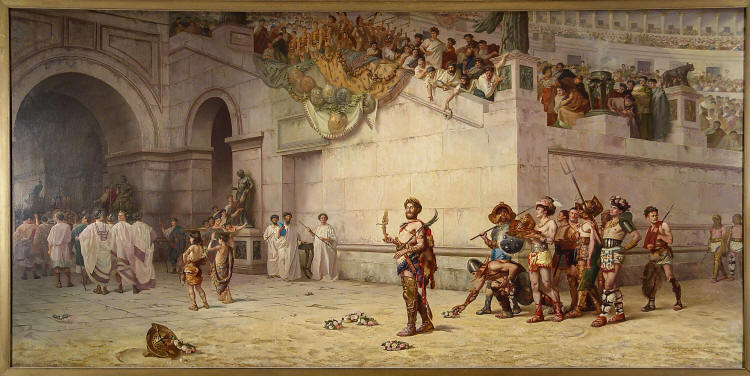
Emperor Commodus
Leaving the Arena
at the Head of the
Gladiators
(detail) by
Edwin Blashfield (1848–1936),
Hermitage
Museum and Gardens,
Norfolk,
Virginia.
Source
The sun rises high over Rome's
Amphitheatrum Flavium, the
mightiest arena in the world.
Only the colossal statue of Nero,
which one-day will lend the stadium its eternal pseudonym,
dwarfs it...
The 50,000 strong crowd of men and women, young
and old, rich and poor, are tightly coiled; one giant organism ready
to strike, to unleash their wrath or their joy.
Though they are not the only ones with the glint of attack in their
eyes.
A flash of light leads to a clash of steel, a spray of sweat, a
cloud of dust, and finally, brutally, a cascade of blood which
unleashes a frenzied pandemonium in the stands…
Those cognizant of TV shows like Spartacus, films like
Gladiator, or indeed, any example from the swords and sandals
genre, will be familiar with images of perfectly formed behemoths
attempting to heroically empty their comrades of their entrails.
Though, as we shall investigate, Hollywood has not quite given us
the full picture.
I know, I know... shocking isn't it!?
To begin with,
gladiators were not perfectly formed.
Indeed, they would be considered overweight
next to modern sportsmen.
Additionally, bloodlust was a secondary
consideration to poise and finesse, and in fact, most
gladiatorial bouts saw the loser escape with his life.
Finally, and, crucially, large parts of Roman
society considered gladiators to be anything but heroic.
As for the famous quote in the title ("Those
who are about to die salute you"), it did genuinely occur in the
pages of
Suetonius.
However, it was supposedly uttered by a group of condemned men in an
attempt to curry favor with the emperor, and not, as
Tinseltown would have us
believe, by every gladiator who entered the arena.
Indeed, it is highly unlikely that any professional fighter ever
said it.
But before we conduct our gladiatorial post-mortem in earnest,
perhaps a look at the origins of the sport is in order. (Unpleasant
as it seems, it's hard to deny that it was a sport - complete with
match day programs and scalpers selling tickets!)
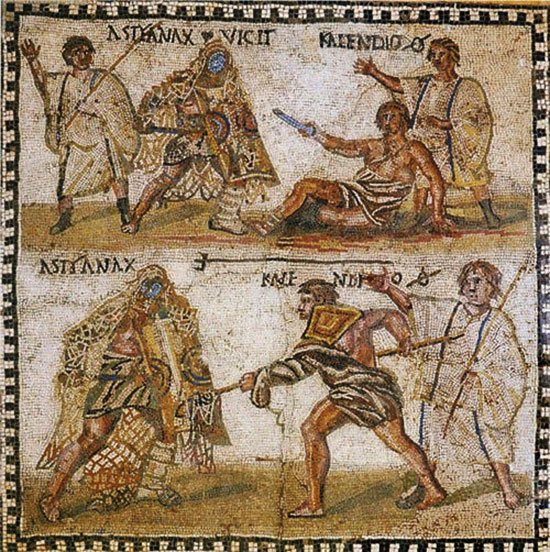
As for the beginnings of gladiatorial combat, there is some dispute,
though most agree it came out of the Italian peninsula... either
from the Etruscans or Campanians.
What seems clear is that the games (ludi) were not intended
to be the great public spectacle they later became. Instead, they
were munera, a type of honorific spectacular dedicated to the
spirit of a deceased ancestor.
What is really astonishing is how fast the event caught on.
The first recorded munus was held in 264
BC, and within 200 years, their popularity and importance had become
such that the Senate had to limit the size of the proposed munus
of none other than Gaius Julius Caesar.
N.B.: Though if we compare how cinema
has changed in only 150 years it is perhaps not so astounding...
Even though the transition from munera to
ludi was a gradual one, we can say with some confidence that
by the time of Caesar, gladiatorial combat had mostly lost its
connotations of filial duty.
Instead, it had become a means of self-promotion
and popular entertainment... and not just in Rome, but also
throughout the rapidly swelling empire.
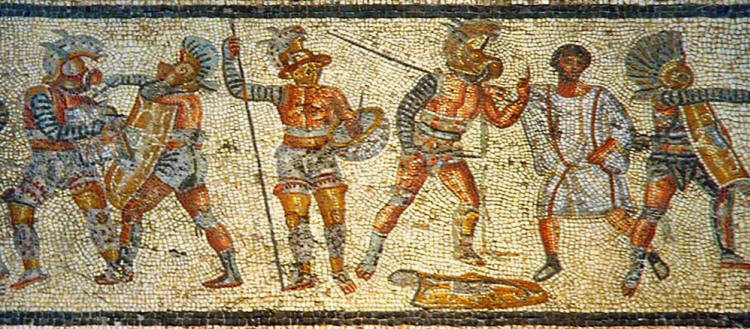
So,
what about the fundamentals of the games and,
more importantly, the gladiators themselves?
A gladiator (from gladius, short sword),
was the king of the sand, a mighty warrior,
fiercely trained for one purpose only.
He was a man of pride, dignity and above all
else, discipline.
He knew his life was forfeit and his only
desire was to live and die with the stoicism and honor befitting
his station.
Despite the fact that gladiators were the
celebrities and sex symbols of their day, they were also so deeply
despised that the very word 'gladiator' was used as an everyday
insult.
They had no citizenship rights, were buried only
with their own kind, and could have their lives expunged at the whim
of their lanista (owner/overseer).
Essentially, they were a de facto category of
slaves...
The antipathy felt towards these subhuman
supermen is partly because of the social makeup of the gladiatorial
class.
They were slaves of various origins: prisoners of war, citizens who
had lost their rights or who couldn't pay their debts, and various
criminals from around the empire.
Only if they were lucky, would they find their
way into a ludus (gladiator school).
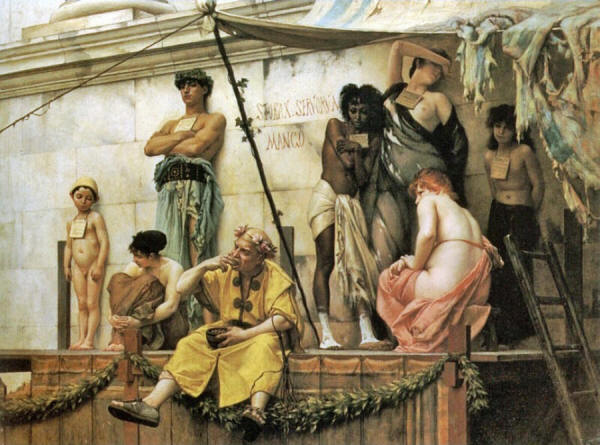
N.B.: if they were unlucky they would
merely be damnati (condemned to fight in the arena) or
noxii (condemned to die a humiliating death in the arena).
The difference being that the noxii would
probably not be given weapons and their remains would be treated in
a manner that would dishonor them for eternity.
All arenarii (people of the arena) were infames i.e.
without rights or social status,
a standing shared by prostitutes, pimps,
actors and dancers.
Gladiators, however, were both simultaneously far
more lauded and reviled than any of these other controversial
professions!
This was all very well for the impoverished, the enslaved and the
criminal - indeed, many were happy to enter a ludus.
It would mean good food (gladiators followed
a high-calorie vegetarian diet), a roof over their head, and a
potential to win money, freedom and that most intangible and
strangely elusive of all things, fame!
Also, it got them out in the fresh air... which is nice.
The peculiarity, therefore, is not that many of
the most desperate ended up in the arena, it's that some of the more
privileged actually volunteered for this ignoble and bloody fate.
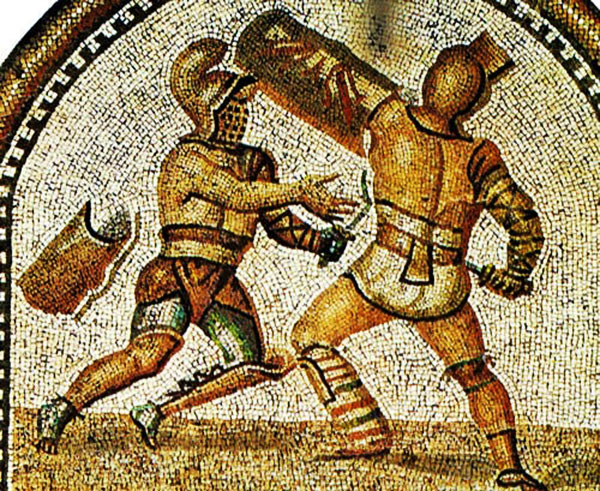
Some scholars estimate that,
as many as half of all gladiators were
volunteers (auctorati) by the time the games were at
their height (1st century BC - 1st century
AD).
But what really boggles the mind is that the lure
of the games was so great that they even managed to entice
aristocrats!
Indeed, it seems there was a significant minority of the noblesse
who disgraced their family name, gave up promising political careers
and disinherited themselves from great wealth.
In fact, it was beholden upon Augustus,
the moral champion of the 1st century AD, to make it
illegal for the senatorial and equestrian classes to fight.
Despite the emperor's absolute power, the
prohibition seems to have had only limited success.
In addition, several emperors themselves are
known to have stepped onto the sand.
This created a bizarre paradox of a man at the
top of the social ladder publically engaging in the most degraded
and base activity possible within his own society.
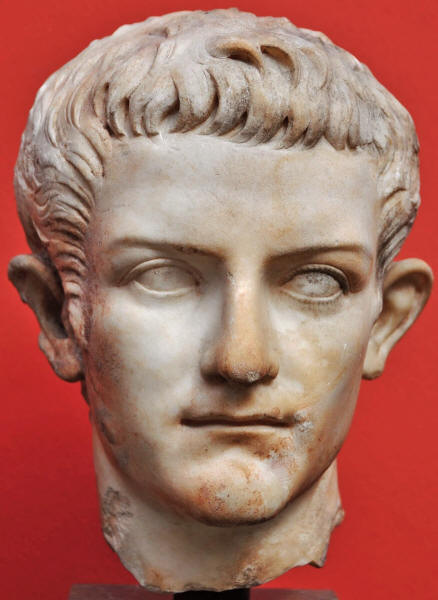
Marble bust of
Caligula
with traces of
original paint.
Caligula, Titus, Hadrian,
Lucius Verus, Caracalla, Geta and Didius Julianus,
...were all said to have crossed that stark line
of dignity during their respective reigns.
This was particularly amazing for Didius
Julianus, as he was only emperor for nine weeks...!
It is almost certain that none of the above competed with any
seriousness and were merely making a populist parade of themselves
or indulging a boyhood fantasy.
Though it's hard to blame them; if I had
unlimited power I would certainly insist on playing ten minutes
of professional football...
However, the most enthusiastic, and therefore
most shameful, participant in ludi was Commodus, the
emperor who you may remember from that film with Joaquin
Phoenix and Russell Crowe... the name of which escapes me...
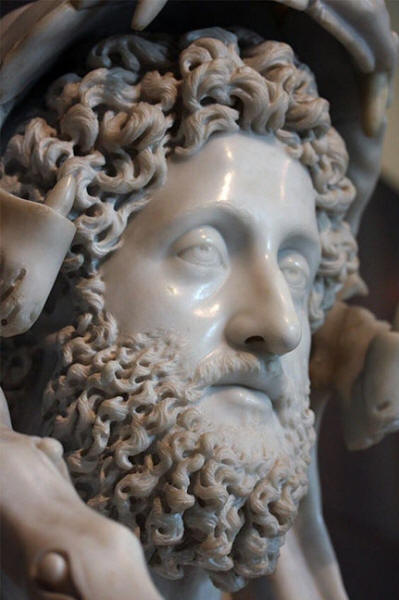
Commodus
Commodus was capricious, cruel and conceited (even by the standards
of emperors).
He was said to have killed 100 lions in a day and
must, therefore, have had some physical and technical proficiency to
avoid looking wholly ridiculous in front of the crowd... especially
as he styled himself as the reincarnation of Hercules...!
Indeed, the masses would have let him know if
he had been entirely ludicrous...
The games were one of the few conduits for
egalitarian outpouring.
It was commonplace for the public to heckle, not just the
participants of the ludi, but the on-watching ruling classes.
In fact, it seems the games presented the
ideal (perhaps unique) opportunity to present a petition to a
politician in front of witnesses...
Though the games were unquestionably popular,
(relatively) cheap to stage and helped school both combatants and
spectators alike in the arts of war,
they eventually fell foul in the later empire
as a result
of Christianity.
As early as the third century AD, the Christian scholar
Tertullian denounced the games as murder, as pagan and as
human sacrifice.
Perhaps it is no surprise that the first emperor
to prohibit the spectacle was Constantine in the 320's AD.
Though this was with little success; it was
necessary to again curtail or prohibit the games in 384, 393,
399, 404, and 438 AD...
By this latter date the
Western Empire was dissolving
into various warring factions and tastes in the
Eastern Empire seemed more
focused on theatre and chariot racing.
One of the hardest things for a classical historian to understand is
the mentality of both the spectators and participants of a
gladiatorial combat.
Though it obviously plays up to our baser instincts and, like so
much sport, creates a tribal mentality, it goes so far beyond the
most violent spectacles available to us today.
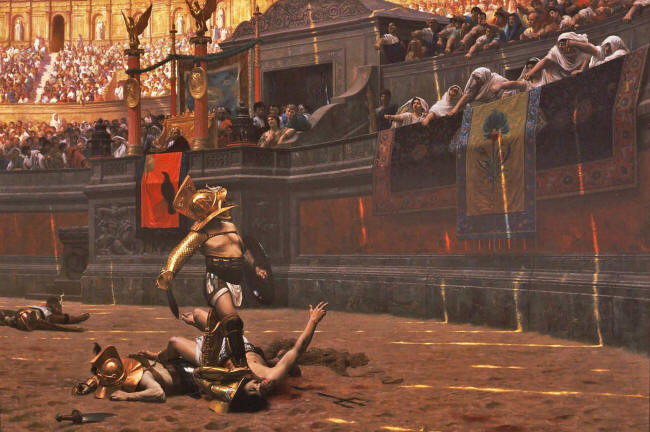
Regardless,
there could have been nothing quite so
dramatic, nothing that sent the heart aflutter and the limbs
aquiver as the moment when a stricken gladiator raised a
finger in submission, presented his neck to an opponent
and all eyes turned to the editor
(producer/sponsor) in whose hands the brilliant wretch's life
lay...
More than anything else, contemplating the
bravery, daring and discipline of these ancient athletes only serves
to highlight the egos, eccentricities and anti-social behavior of
their modern counterparts...
Despite doping, deflated pigskins, greasy palms and feigned injury,
the worship, adulation and monetary rewards we bestow upon
our physical elite shows no signs of abating.
Perhaps the Roman way is better, perhaps it's a healthier
approach:
to marvel, to cheer, to applaud and goggle,
but still, when the dust has settled and the blood has dried to
remember that they are only mortal.
And much, much worse than that, that they are…
yuck… entertainers...!
|









